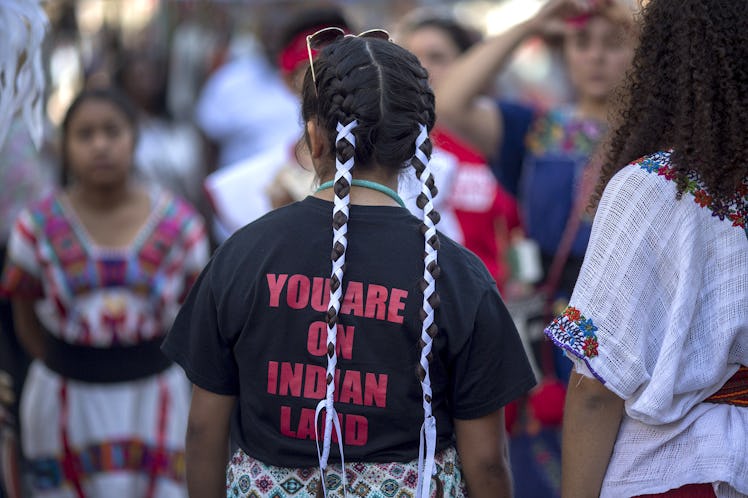
Indigenous Peoples' Day Is Growing, Fast
Since 1971, the United States has celebrated Columbus Day on the second Monday of October every year. In recent years, however, a handful of states and more than 100 cities have decided to flip the script by instead celebrating Indigenous Peoples' Day, due to Christopher Columbus' violence against Native American and indigenous populations. So which states celebrate Indigenous Peoples' Day? The number grows every year.
According to ABC News, at least eight states currently celebrate Indigenous Peoples' Day, as well as 130 cities. On Oct. 8, Wisconsin Gov. Tony Evers signed an executive order to replace Columbus Day with Indigenous Peoples' Day, making his state the latest to do so. After signing the executive order, Evers stated that "Native Americans in Wisconsin and throughout our country have suffered unjust treatment — often at the hands of our government — and today is about recognizing that Wisconsin would not be all that it is without Indigenous people." Thanks to Evers' executive order, Wisconsin joined New Mexico, Maine, Vermont, North Carolina, Alaska, Oregon, and South Dakota in celebrating Indigenous Peoples' Day.
The holiday has become increasingly prominent as an alternative to Columbus Day, which represents the anniversary of Christopher Columbus's arrival in the Americas on Oct. 12, 1492. In recent years many Americans have begun openly questioning whether Columbus' legacy should be celebrated, given his documented abuse of the indigenous communities he encountered in the Americas — including enslavement, violence, and the genocide of the Taino population of the West Indies.
The growing awareness of the history of violence has led many to choose to celebrate indigenous communities instead. In 2011, the National Congress of American Indians (NCAI) passed a resolution to officially endorse changing Columbus Day to Indigenous People's Day. "Having the citizens of the United States of America recognize and celebrate the heritage of indigenous peoples is necessary to respect their history and unite all peoples together," the resolution read.
Wisconsin isn't the only newcomer to the group. In the past few years, more and more states have given the holiday official status. In April 2019 New Mexico Gov. Michelle Lujan Grisham and Maine Gov. Janet Mills both signed bills enacting Indigenous Peoples' Day in their states. Lujan Grisham said she signed this legislation in order to send "an important message of reconciliation" and to celebrate "the essential place of honor native citizens hold in the fabric of our great state." Mills, meanwhile, noted that "there is power in a name and in who we choose to honor." Then, on May 6, Vermont Gov. Phil Scott signed a similar bill to implement Indigenous Peoples' Day in his state, per The Washington Post.
South Dakota was the first state to ditch Columbus Day. Back in 1990, the state decided instead to adopt Native American Day, as part of a Year of Reconciliation. Since then, numerous other states have joined South Dakota in choosing to honor tribal communities rather than Columbus.
In June 2017, Alaska became the first state to officially implement an Indigenous Peoples' Day. At that time, former Alaska Gov. Bill Walker signed legislation officially recognizing the second Monday in October as Indigenous Peoples' Day, following two temporary observances of the holiday. “This official recognition is just one way we as a state can acknowledge and celebrate the contributions made by First Peoples throughout the history of this land," Walker said after the signing the bill. Not long after that, in Oct. 2017, Oregon Gov. Kate Brown issued a proclamation in which she announced that her state would no longer be celebrating Columbus Day. Instead, Brown said at the time, Oregon adopted Indigenous Peoples' Day to honor “the many contributions made to our communities through indigenous peoples.” Finally, in October 2018, North Carolina also replaced Columbus Day with Indigenous Peoples' Day.
It isn't just states that are trying to change the narrative, either. More than 100 cities have officially renamed Columbus Day — and Washington, D.C. wants to join them. On Oct. 8, the D.C. city council supported emergency legislation to adopt Indigenous Peoples' Day for 2019. This legislation is only temporary, however, and will only be rendered permanent if it receives Congressional approval.
For years, the United States celebrated Columbus as a successful explorer. But now, following years of advocacy from Native American and indigenous activists, more states and cities are moving to honor indigenous communities instead.